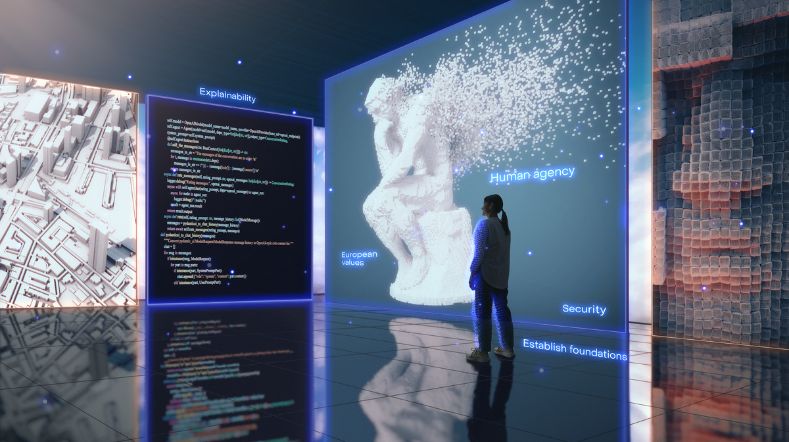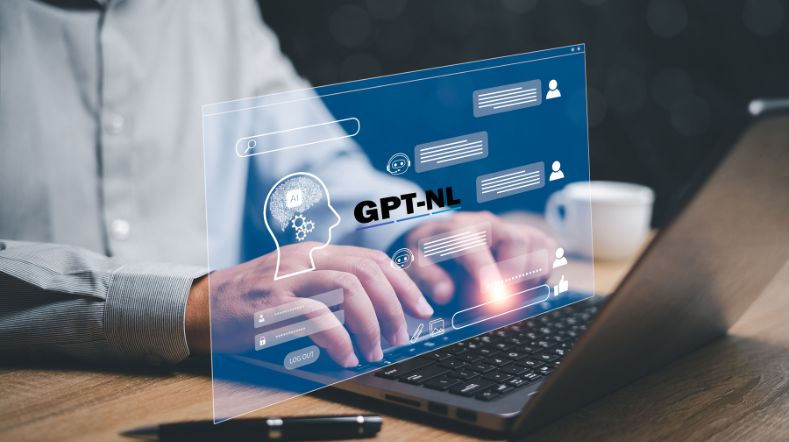
ObjectivEye: AI-assisted human recruitment
Faced with unprecedented staff shortages, organisations are nonetheless struggling to get their vacancies filled. More than 50% of applicants are excluded by automated systems, and 52% of organizations experience mismatches with hired employees. In response, TNO developed an ethical and explainable AI technology, which has since evolved into the spin-off ObjectivEye.

‘Qualified candidates disappear in the filters of outdated systems. For example, if you’re proficient in the programming language Python but fail to mention it in your CV, you’ll be filtered out.’
Why current recruitment tools are failing to spot talent
Existing applicant tracking systems (ATS) are made for yesterday’s job market, they primarily look for the right keywords in an applicant’s CV. However, the job market of today calls for a broader view that first and foremost, looks at a person’s competences.
‘We found that filters in existing technology can do a lot of harm,’ explains ObjectivEye's CEO Noura El Ouajdi. ‘Qualified candidates disappear in the filters of outdated systems. For example, if you’re proficient in the programming language Python but fail to mention it in your CV, you’ll be filtered out.’
Intelligent filtering is therefore very necessary, but it doesn’t solve everything. Recruiters also need support to avoid unconscious bias. These biases creep in quickly, especially since they spend an average of just 6 seconds on a CV. Ethical and insightful AI can play an important role here.
Best of both worlds: 3 core areas in which humans and AI can reinforce each other
Clearly, an AI-assisted recruiting tool raises questions of whether it is safe and how much control the recruiter still has over the process. ‘ObjectivEye works as an additional intelligence layer on top of existing recruitment systems,’ says Noura. ‘It doesn’t exclude the people in the process.’ The tool supports 3 crucial steps in the recruitment process:
The system translates vague job titles into specific skills from databases such as ESCO and CompetentNL.
Instead of immediately looking at CVs, recruiters now ask applicants to answer competence-based questions first, prepared with the help of ObjectivEye. That way, they obtain information instantly about a candidate’s actual skills, with relevant examples from their professional background.
Although AI analyses the answers and provides score suggestions, the recruiter is still in the driving seat. ‘The recruiter can modify or even reject the AI suggestion. There’s always a human in the loop,’ Noura stresses. ‘You can see exactly why the AI suggests a certain score.’
The ObjectivEye process in 5 steps
- Translate the role into specific skills.
- Generate an inclusive vacancy text with AI support.
- Provide competence-based questions, answered anonymously.
- Review the answers together with AI.
- Make a final selection with full transparency and accountability.

‘It makes you work harder to challenge your own assumptions.’
DNB pilot: more applications, more diversity, more competence-based
De Nederlandsche Bank (DNB) was the first to deploy a pilot scheme using ObjectivEye to recruit for their traineeship programme, aiming to open up opportunities to a more diverse range of people. With the exception of generating the vacancy text, almost the entire ObjectivEye process was applied in this case. Jeroen Fledderus, HR Manager at DNB, is enthusiastic about the development.
During the pilot scheme, the number of applicants shot up from 200–300 to around 700. ‘This can be attributed in part to our recruitment drive,’ says Jeroen. ‘But I suspect ObjectivEye also played a role in this. You often hear that you have to have a double master’s degree to join the DNB traineeship, but if you’re asked to answer some in-depth questions that you can use to determine whether you’re suitable, you’re less likely to feel you need a perfect CV.’
‘We asked questions such as ‘Describe a time when you took initiative without waiting for instructions from others’, Jeroen explains. ‘That provided us with much more useful information.’ In addition, less time spent focusing on the CV opened up the pool to applicants from 7 different fields of study.
Even more interestingly, two human reviewers came to the same conclusion in 60% of cases, but the agreement between AI and the recruiters was 90%. ‘It kept us on our toes,’ Jeroen enthuses. ‘It makes you work harder to challenge your own assumptions.’
AI under the AI Act
Whenever the term AI is mentioned, privacy and traceability immediately come to mind. These themes are also central to the EU’s AI Act, which classifies recruitment systems as high-risk. ‘It helped that ObjectivEye started out as a TNO research project,’ Noura says. ‘Thanks to both our technical knowledge and our insights regarding policy, we managed to develop the software in line with the requirements of the AI Act.’
Unsurprisingly, DNB took privacy very seriously, as Jeroen confirms. ‘However, once privacy was shown to be safeguarded, the mood lightened. Now most people think it’s cool that our organisation is using it. Suddenly we’ve become a role model, showing people that it can be done this way.’

‘A candidate’s competences and talents should be more important for a role than a CV and cover letter.’
ObjectivEye at the Ministry of Social Affairs and Employment
DNB is not the only one to try out the technology: more and more large organisations in regulated sectors are also exploring the possibilities. The Dutch Ministry of Social Affairs and Employment is also launching a pilot with ObjectivEye. ‘A candidate’s competences and talents should be more important for a role than a CV and cover letter,’ says Anil Kaplan, Recruitment Coordinator at the Ministry. ‘By bringing more objectivity to recruitment, we increase the chances of hiring people who reflect society more accurately. ObjectivEye will support us in doing this.’
In addition, the focus on competences should also help enhance internal mobility. ‘We want more diverse talent to advance to senior positions in the Ministry. We expect ObjectivEye to have a positive impact on our people’s internal mobility.’
Recruiting with ethical AI is more human than ever
With the huge challenge of finding suitable talent, there is no doubt that we need to let go of outdated methods. Smarter tools are required, and ObjectivEye is proving itself to be just the tool for the job. It does not replace the recruiter, but it is an indispensable assistant that removes bias, makes hidden talent visible, and ensures a more transparent recruitment process.
Stop missing out on the right candidate
Find out what ObjectivEye can do for your organisation. Request a demo or pilot now Noura El Ouajdi.
Get inspired
Balancing skepticism and blind trust: critical thinking as the key to responsible and effective use of GenAI


From reactive to proactive: How organisations gain control over GenAI governance


How TNO is leading the drive towards sovereign, responsible Dutch AI


TNO’s Vision for Responsible AI That Works


Large dataset news organizations for Dutch AI language model GPT-NL


